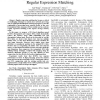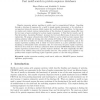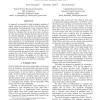25 search results - page 3 / 5 » A regular expression matching using non-deterministic finite... |
FOSSACS
2008
Springer
13 years 7 months ago
2008
Springer
The problem of converting deterministic finite automata into (short) regular expressions is considered. It is known that the required expression size is 2(n) in the worst case for ...
ICC
2011
IEEE
12 years 5 months ago
2011
IEEE
—Regular expression matching has become a critical yet challenging technique in content-aware network processing, such as application identification and deep inspection. To meet ...
CSR
2006
Springer
13 years 9 months ago
2006
Springer
Regular expression pattern matching is widely used in computational biology. Searching through a database of sequences for a motif (a simple regular expression), or its variations...
FPL
2008
Springer
13 years 7 months ago
2008
Springer
An approach is presented for high throughput matching of regular expressions (regexes) by first converting them into corresponding Non-deterministic Finite Automata (NFAs) which a...
CORR
2009
Springer
13 years 3 months ago
2009
Springer
The minimal deterministic finite automaton is generally used to determine regular languages equality. Using Brzozowski's notion of derivative, Antimirov and Mosses proposed a...



